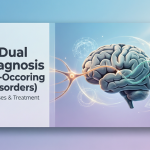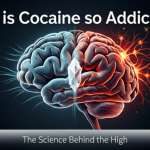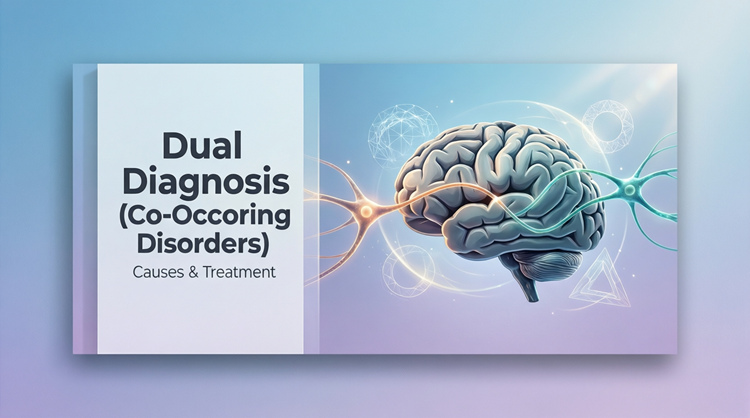Bipolar disorder exists as a complicated mental illness which impacts the lives of numerous people around the world. The mental condition features abrupt shifts between emotional states which range between intense manic and hypomanic states and severely depressive phases. The mood changes of bipolar disorder affect how people sleep as well as their energy levels and behavioral responses and thinking clarity and judgment abilities. Society wonders about the genuine factors which trigger bipolar disorder. Does the condition arise exclusively from environmental factors or does it exist in people’s genes? Knowledge about bipolar disorder genetics becomes crucial for people who have a family background of mood disorders.
This article will investigate bipolar disorder as a mental illness which discusses its clinical definition along with characteristic signs and the genetic basis for inheriting it as well as possible reasons and hazard predictors and therapeutic approaches plus lifestyle strategies for mental well-being.
What is Bipolar Disorder?
The identification of bipolar disorder genetics requires a basic knowledge of how this disorder affects patients. Bipolar disorder carries two names as manic-depressive illness which produces unusual mood changes together with energy levels and activity patterns and concentration abilities. A person with bipolar disorder experiences fluctuations between depression and mania but their condition also includes moderate manic phases.
The symptoms of bipolar disorder differ between mood episode types as well as their specific phases.
- Manic symptoms: The symptoms of manic depression include elevated energy levels and brief sleep requirement, excessive self-importance together with fast speech patterns, impulsive behavior and thought acceleration.
- Depressive symptoms: A person may experience reduced energy along with depression and despair and activity disengagement and attention problems and suicidal gestures.
Awareness of these symptoms enables prompt detection of bipolar disorder because timely recognition allows for improved therapeutic success.
Does Bipolar Disorder Run in Families?
The question that frequently seeks an answer is whether bipolar disorder follows patterns through family lines. Multiple research studies demonstrate that bipolar disorder shows clear patterns of inheritance within families. The risk for someone to acquire bipolar disorder expands greatly when the individual has a first-degree relative who suffers from bipolar disorder. The genetic inheritance of bipolar disorder does not work through a single inherited factor. A person inherits genetic predispositions to bipolar disorder while environmental influences also contribute to its development.
Scientific studies show that identical twins share a 40% to 70% probability of developing bipolar disorder when one of them has it. The percentage suggests heredity plays an important role in disorder development.
Genetics alone function independently from determining life outcomes. Apart from genes, lifestyle together with environmental factors and stress must be added to trauma to understand the development of this condition. A family history raises your likelihood of developing bipolar disorder but it does not determine whether you will become affected by the condition.
100% Confidential Support is Available 24/7
No matter what you’re going through, you’re not alone. Our dedicated team is here to provide a safe, judgment-free space where you can talk openly and honestly. Whether you need emotional support, resources, or just someone to listen.
We’re here for you—completely confidential and always respectful of your privacy. Call us today!
The Genetic Factors of Bipolar Disorder
Both scientific research and genetic investigation of bipolar disorder have made multiple fundamental discoveries about its biological foundation. Several genetic components contribute to risk development of this condition while every single gene contributes only minimally. The genes alter brain functionality mainly in regions responsible for mood control and energy management and regulation of circadian rhythms.
The latest genomic research using genome-wide association studies (GWAS) has discovered particular genetic indicators that demonstrate links to bipolar disorder. Several genes affect neurotransmitter functions, particularly serotonin and dopamine which serve to regulate mood and behavior.
Research indicates bipolar disorder runs in families because its development demonstrates hereditary elements which overlap with both schizophrenic and major depressive syndromes. Research on genetic mutations reinforces the intricate nature of bipolar disorder origins along with illustrating mental health disorders’ profound relationship with one another.
Having the genetic markers that indicate bipolar disorder does not automatically lead to developing the condition. The combination of genetic susceptibility factors becomes active because of environmental conditions that result in the appearance of symptoms.
Deland Treatment Solutions
Battling with Drug and Alcohol Addition? Remember, you are not alone and we are here to help you!
What Causes Bipolar Disorder?
The main influence of genetics on bipolar disorder does not fully explain its origins. Bipolar disorder emerges from multiple interacting genetic, biological and environmental and psychological elements.
Here’s a closer look at the key contributors:
- Biological differences: Research shows that bipolar disorder patients display abnormalities in how their brain functions along with how their brain structures are arranged. Brain scans indicate prefrontal cortex along with limbic regions display variations in bipolar disorder patients who control their emotions and make decisions.
- Neurochemical imbalances: A healthy mood depends significantly on three important neurotransmitters which include serotonin together with dopamine and norepinephrine. The metabolism of serotonin, dopamine and norepinephrine in the brain affects emotional stability when they become unbalanced.
- Stress and trauma: People with genetic impulsiveness toward bipolar disorder may develop the condition when they experience major life stressors or past trauma or abuse.
- Substance use: Substance abuse raises the possibility of bipolar illness emergence or intensifies current symptoms of bipolar disorder.
- Sleep disruptions: People who are vulnerable experience mood episodes when they have irregular sleeping patterns or when they do not get enough sleep over a long period of time.
Patients may use knowledge about bipolar disorder to develop appropriate treatments while creating management plans.

Who is at Risk of Bipolar Disorder?
Several medical and environmental conditions boost a person’s risk of developing bipolar disorder. Learning about these risk factors enables you to take prompt action either for your own help or for supporting someone who may be at risk.
- A higher risk of developing bipolar disorder exists when anyone in your family lineage reveals a diagnosis of this disorder.
- Oppressive levels of stress may trigger bipolar disorder symptoms.
- Bipolar disorder risk is increased when individuals experience traumatic events particularly when such experiences happen during childhood.
- Both using drugs or alcohol during substance abuse and alcohol abuse trigger mood swings that lead to bipolar disorder development.
- Disturbed sleep and irregular sleep patterns have proven to be triggers for bipolar disorder development.
If you notice early warning signs in yourself or a loved one, don’t wait. Early intervention with proper bipolar disorder medication and therapy can make a world of difference.
Treatment of Bipolar Disorder
Modern treatment of bipolar disorder shows substantial advancements during recent years. Bipolar disorder remains a life-long condition yet people find success in treating this condition through appropriate medication combinations together with psychotherapy and lifestyle modifications.
Medication for bipolar disorder:
- Mood stabilizers: Lithium represents one of the best-recognized medications that effectively treats conditions.
- Antipsychotics: These are often used to control manic or mixed episodes.
- Antidepressants: Used cautiously and usually alongside mood stabilizers to avoid triggering manic episodes.
Psychotherapy:
- Cognitive Behavioral Therapy (CBT): Helps individuals identify and manage negative thought patterns.
- Psychoeducation: Teaches patients about their condition, helping them recognize triggers and early symptoms.
- Family therapy: Supports families in understanding the disorder and improving communication.
Lifestyle management:
- Maintaining a regular sleep schedule
- Stress reduction techniques such as mindfulness and meditation
- Avoiding alcohol and recreational drugs
- Building a strong support network
The team at DeLand Treatment Solutions generates unique wellness and stability plans through evidence-based therapies and mood stabilizing medications for long-term health.

Conclusion
So, is bipolar disorder genetic? Genetics show a strong influence in bipolar disorder formation while other elements also contribute to its occurrence. Bipolar disorder develops due to a mixture of genetic inheritance from parents along with neurological factors and personal experiences and environmental elements that become triggers. People who have bipolar disorder in their family background normally experience worry about their potential risks.





















